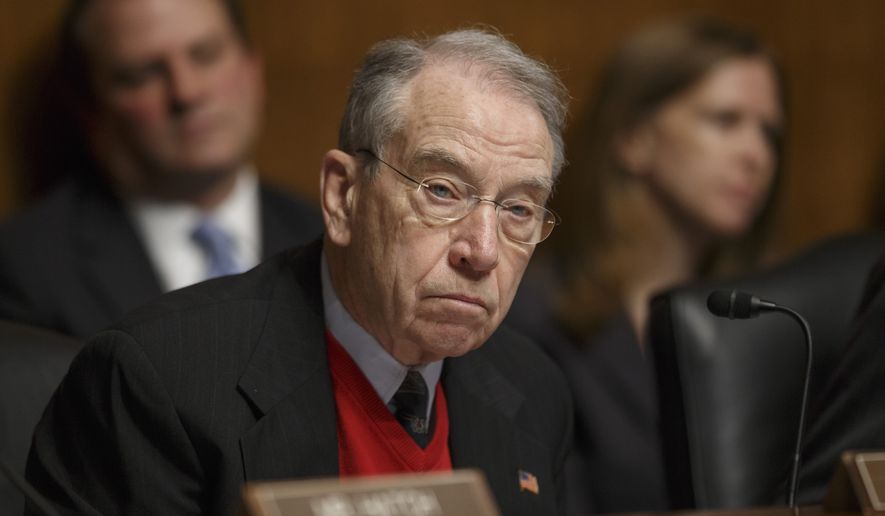Lawmakers of both parties told the FBI that the agency culture and structure are both hostile to whistleblowers, a fact they said the bureau needs to change, from top to bottom.
“Whistleblowers are kind of treated like a skunk at a picnic, and I hope you’ll do all you can to reverse that,” Sen. Chuck Grassley, Iowa Republican and chairman of the Senate Committee on the Judiciary, told FBI Associate Deputy Director Kevin Perkins at a hearing Wednesday.
The FBI’s legal protections for whistleblowers are weaker than at any other federal agency, as it was exempted from the Whistleblower Protection Act.
FBI employees have no ability to appeal for an independent judgment outside the Department of Justice, can only report mismanagement to a few employees to qualify for whistleblower protections and have experienced long delays in getting their claims processed by the agency — in some cases up to 10 years.
Moreover, a Government Accountability Office report last month found nearly 90 percent of FBI whistleblower claims were dismissed by the agency, and in only three cases did the Department of Justice side with the complainant.
Another report from the Department of Justice found similar issues, prompting the ire of lawmakers on both sides of the aisle and a general worry the FBI’s whistleblower protocols are creating a chilling effect on those wanting to come forward.
“Unfortunately, two recent government reports — one by the Department of Justice and another by the Government Accountability Office — highlight the obstacles that remain for FBI employees to appropriately blow the whistle and seek protection from retaliation,” said Sen. Patrick J. Leahy of Vermont, the panel’s ranking Democrat. “It is important that all government employees are provided with strong and effective avenues to come forward with evidence of government waste, fraud and abuse.”
The hearing, evaluating how the FBI handles its whistleblower cases, was held after The Washington Times revealed this week how an employee within the bureau was downgraded in his performance review and warned of retaliation by a lawyer within the FBI’s Office of Integrity and Compliance after he reported what he considered waste, fraud and abuse.
When questioned about The Times report by lawmakers, Mr. Perkins, the FBI official, said simply: “I’ve only seen what was written in the paper, but speaking on behalf of [FBI Director James B.] Comey and myself, we will not and do not tolerate retaliation of whistleblowers.”
In order to help the FBI achieve these goals, the agency must protect disclosures to bosses, quicken the time it takes to assess cases and allow judicial review, a Congressional panel testified.
The FBI has 35,000 employees, but there’s only nine people those employees can go to in order to voice their grievances.
Because the FBI doesn’t allow whistleblowers to report directly to their chain of command or management, at least 17 whistleblower complaints evaluated by the GAO got dismissed because the whistleblower went to someone other than one of the few people authorized to take such a claim.
The length of time the agency takes to review such claims is also problematic, said Stephen Kohn, executive director of the National Whistleblowers Center, who testified Wednesday. The FBI should be able to complete a review within a year, and if it doesn’t, should be subject to federal court pressure, which it currently is not, he said.
In one whistleblower case outlined in the hearing, it took 10 years for the FBI to resolve the case — after the whistleblower had already passed the FBI’s mandatory retirement age of 57 and thereby couldn’t be reinstated.
“[FBI whistleblower] culture needs to be reformed both legally, through the actions of Congress, and by the leadership of the FBI being pushed to do the right thing,” said Mr. Kohn.
When a whistleblower is proven correct, FBI leadership should praise them in public, which would help motivate others to come forward, he said.
“What you need is a change from the top, from the director on down,” said Mr. Kohn. “What’s missing in many of these cases is any recognition from the top down that anything wrong happened. It’s one thing getting an order of enforcement from DOJ and another thing having the top leadership saying [the reported mismanagement] was wrong, and the whistleblower is right.”
For its part, the FBI said it is working to better educate its employees about their whistleblower protections and process, and that all FBI whistleblowers are protected by federal law from retribution.
“The FBI recognizes the important role played by whistleblowers in our law enforcement efforts,” said Mr. Perkins. “We take very seriously our responsibilities with regard to FBI employees who may protect disclosures under the regulations, and we appreciate this committee’s long-standing interest in these important matters.”
• Kelly Riddell can be reached at kriddell@washingtontimes.com.




Please read our comment policy before commenting.